Go beyond the scoreboard
Get the latest on L.A.'s teams in the daily Sports Report newsletter.
You may occasionally receive promotional content from the Los Angeles Times.
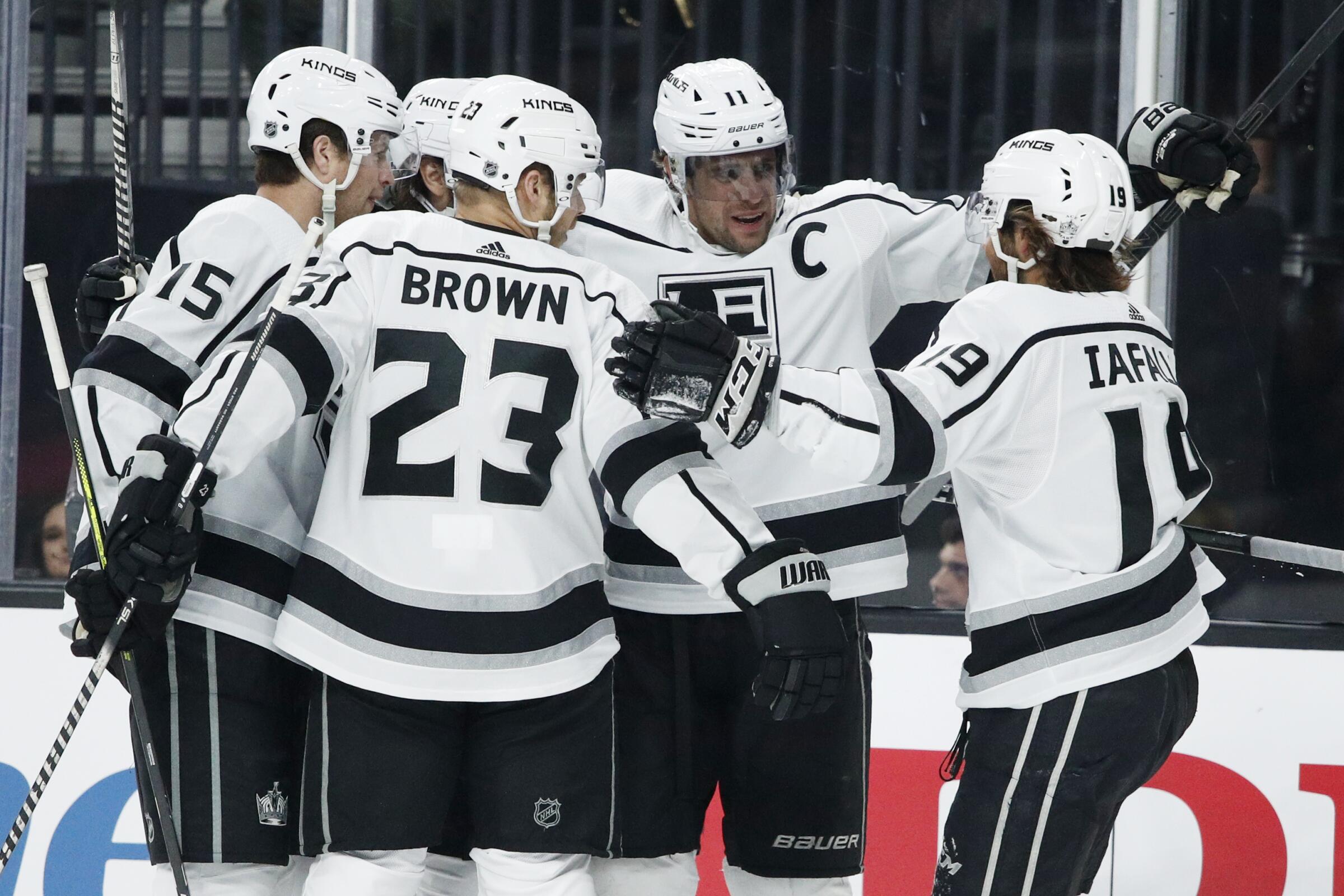
The rest of the hockey world might disagree, but the Kings have a clear objective entering a pandemic-shortened 2021 NHL season.
Get back to the playoffs.
“It’s realistic to think about playoffs for sure,” captain Anze Kopitar said.
Defenseman Drew Doughty concurred: “I don’t see why we can’t.”
Ditto general manager Rob Blake: “That’s what we expect to do.”
It might be an ambitious target for a team coming off back-to-back bottom-two finishes in the Western Conference, the first time the franchise missed consecutive postseasons in a decade. But after stockpiling assets and resetting the roster, the Kings think the present might finally be intersecting with their promising future.
“It’s an exciting time to be part of the Kings,” forward Dustin Brown said Thursday after the team’s first day of training camp. “We got a lot of young talent that we’ve accumulated over the last few years. And we still got some older players that can play. So it’s just a matter of meshing them together and getting on the right track.”
With opening night set for Jan. 13, here are five things the Kings need to do to return to relevancy and position themselves for a playoff push in 2021:
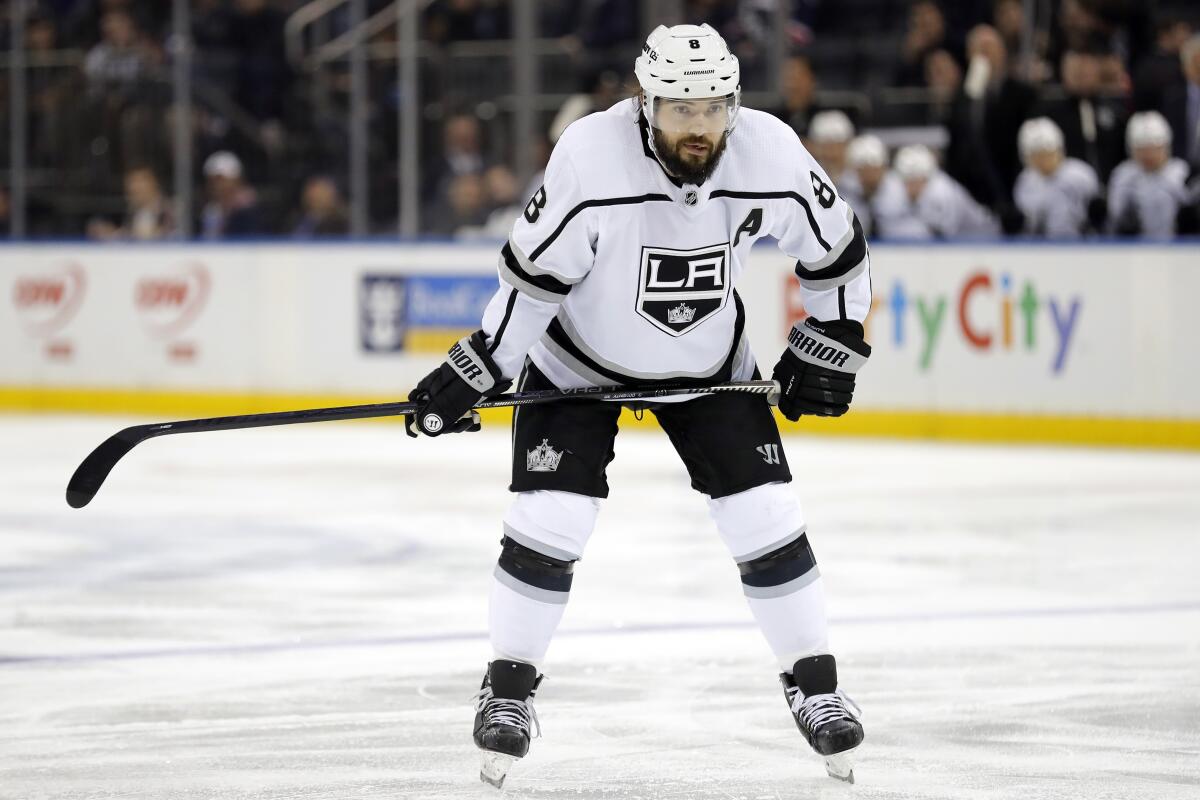
Fitness wasn’t much of a concern during the Kings camp-opening scrimmage on Thursday. A nine-plus month layoff had given players time to relax, recover and rebuild stamina. Coach Todd McLellan said several players set personal records in physical testing. Doughty explained this offseason was the first time in years he was able to “actually lift weights for real, get heavy, get stronger.”
“In the past, it was all maintenance stuff,” Doughty added. “So yeah, it was a blessing in disguise.”
The Kings’ real challenge during this two-week camp will be re-immersing themselves in the up-tempo and aggressive-forechecking system McLellan and his staff began implementing last season — a growth process that saw the Kings win their final seven games, largely behind improved goaltending and defense, before the schedule was suspended by the COVID-19 pandemic.
The NHL’s COVID-19 protocols presents challenges for the Kings and Ducks as both teams look to bounce back from disappointing seasons.
“It’s really not rocket science,” Kopitar said. “We took a good step in the right direction last year. But now we can’t give anything back. We have to start where we left off.”
To compete for one of the four playoff spots in a new-look eight-team West division — the NHL temporarily realigned into four geographic divisions this year, with teams playing their entire 56-game schedules against opponents from their own region — the Kings can’t afford to get off to slow start as they did a year ago. Through 56 games in 2019-20, they were 19-32-5.
“As much as we talk about ‘reestablishing,’ we’re going to need growth at some point too,” McLellan said. “That’s about where we’re at as an organization: reestablish and begin to grow.”
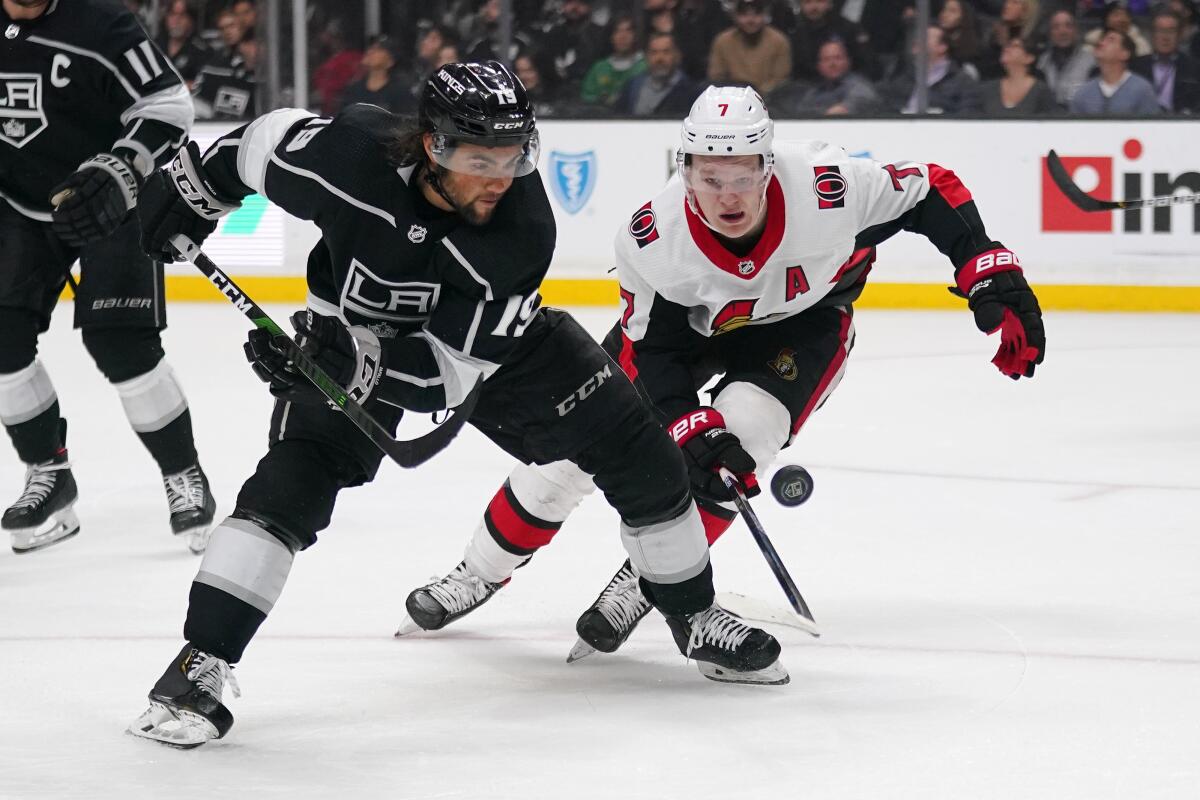
The biggest area of improvement for the Kings: creating more offense.
Despite ranking third in the NHL in shots on goal and shot differential last season, the Kings’ 2.53 goals per game was the second-fewest in the league. Part of the problem was execution, with too many grade-A chances missed. Part of it was quality, with the team too often settling for low-percentage attempts far from the net. And part of it was special teams, with the Kings converting just 17.1% of their power plays, ranking 26th in the NHL.
The roster hasn’t been significantly altered from last season. Former 30-goal scorer Andreas Athanasiou, who signed a one-year, $1.2-million contract with the team this week, and Lias Andersson, the seventh pick in the 2017 draft who was acquired in a 2020 draft day trade with the New York Rangers, were the most notable offensive additions to a team that had only two players (Kopitar and Alex Iafallo) exceed the 35-point plateau in 2019-20.
But the Kings are hopeful the continuity of McLellan’s system, as well as the development of such younger forwards as Gabriel Vilardi, will help.
“We’re not talking about adding 50 or 60 goals, which is unrealistic to our lineup,” McLellan said. “But if we can add 10 or 15 even and cut the goals against down a little bit, all of a sudden we’re in the mix.”
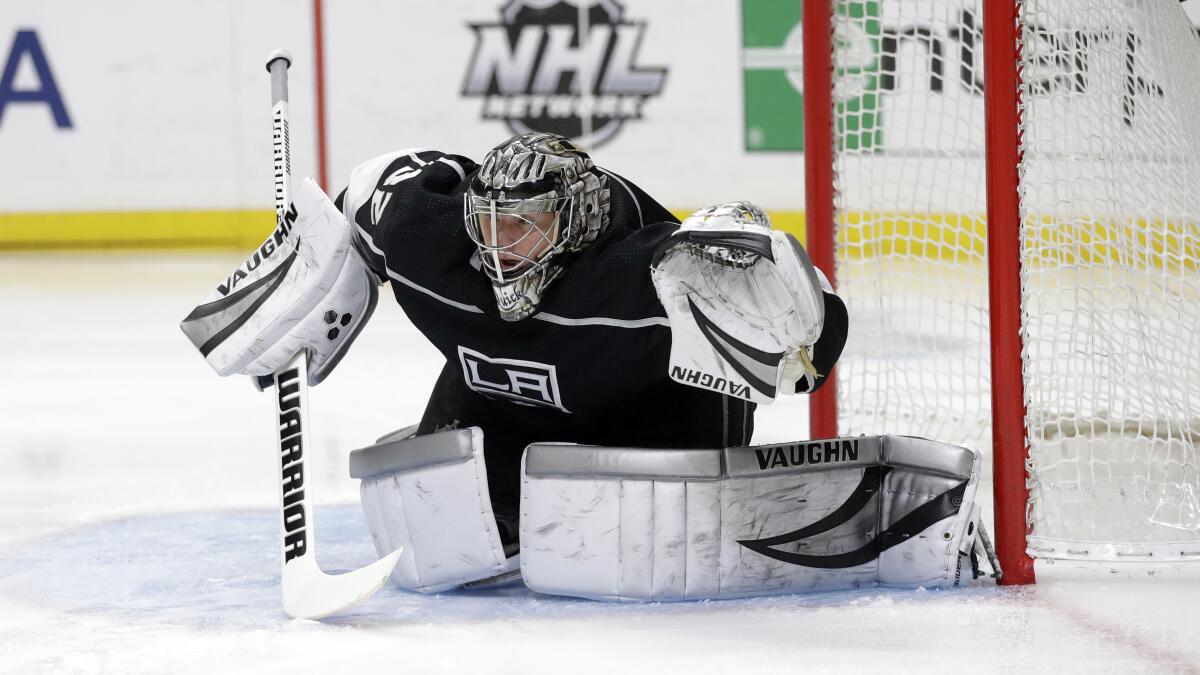
The Kings’ biggest strength seems to be in net, where veteran Jonathan Quick and the up-and-coming Cal Petersen will probably split time to at least begin the season.
Quick, who turns 35 on Jan. 21, overcame a poor start to last season by posting a .921 save percentage and 2.39 goals-against average over his final 22 games.
Petersen, a 26-year-old who will be embarking on his first full NHL campaign, has been sharp in his brief call-ups with the Kings over the last two seasons, collecting a .923 save percentage and 2.62 goals against average in his first 19 career games.
The Kings also signed Troy Grosenick and J-F Berube to contracts this season, with NHL teams required to keep three goalies between their active roster and taxi squad at all times.
“I think it’s getting harder and harder for a single goalie to run the table,” McLellan said, adding: “I think you’re going to need two, maybe even three goaltenders at some point during the year. And we’ll approach it that way. We don’t feel like it’s Quickie’s net or Cal’s net. We feel like we have a net that both of them are very capable of playing in.”
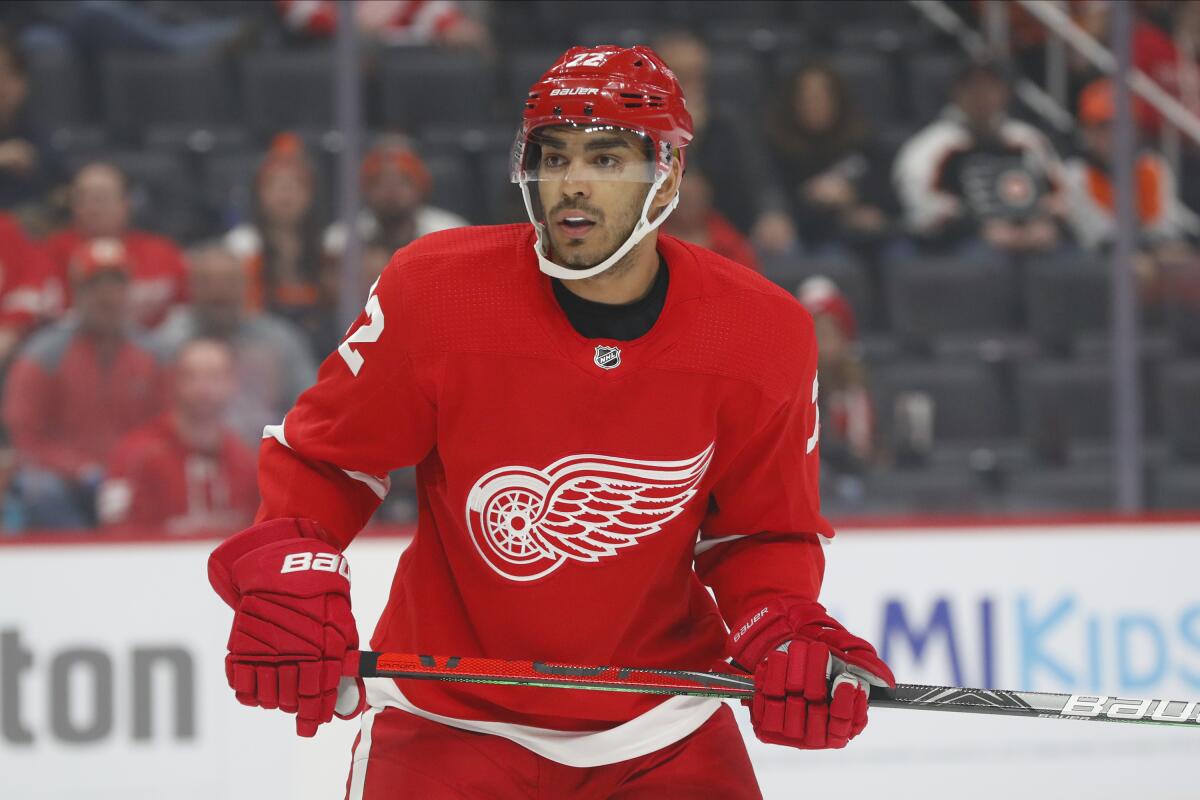
While Athanasiou will have to wait and clear a quarantine period before joining camp later this week, the Kings’ other key offseason acquisition made a strong first impression Thursday.
Two-time Stanley Cup champion Olli Maatta, a 26-year-old left-handed defenseman the Kings acquired in an October trade with the Chicago Blackhawks, slotted in next to Doughty on the team’s top blue-line pairing.
“Our games are very similar,” said Doughty, who has cycled through a host of different — and often less experienced — partners in recent seasons. “He used to spend his offseasons in [Doughty’s Ontario, Canada hometown] London so I skated with him for maybe three or four summers there. I get along with him really well. I think we’re going to be something special together.”
That could be a key development for the Kings. Doughty, 31, might be the veteran they most need improvement from. Though the team believes his numbers don’t tell the full story, the former Norris Trophy winner has seen his production slip significantly over the last two seasons.
“A lot of people have me written off as not even a good player anymore,” Doughty said. “So all that becomes personal, and all that drives me to be better this year, to make our team better.”
The Kings will also have to decide which prospects crack their opening night roster. Among players aged 22 or younger, Vilardi looks like the only lock. Andersson, Samuel Fagemo, Jaret Anderson-Dolan, Akil Thomas, Rasmus Kupari, Matt Luff and Carl Grundstrom could all be in contention for a forward spot; Mikey Anderson, Kale Clague and Tobias Bjornfot (who played in the World Junior Championship) could compete for a position among the defensemen.
Fellow World Juniors participants such as Quinton Byfield, Alex Turcotte and Arthur Kaliyev are also set to join either the Kings’ taxi squad or their minor-league roster following that tournament’s conclusion. The team appears unlikely to play any of them to eclipse the seven-game NHL threshold in order to preserve a year on their entry-level contracts.
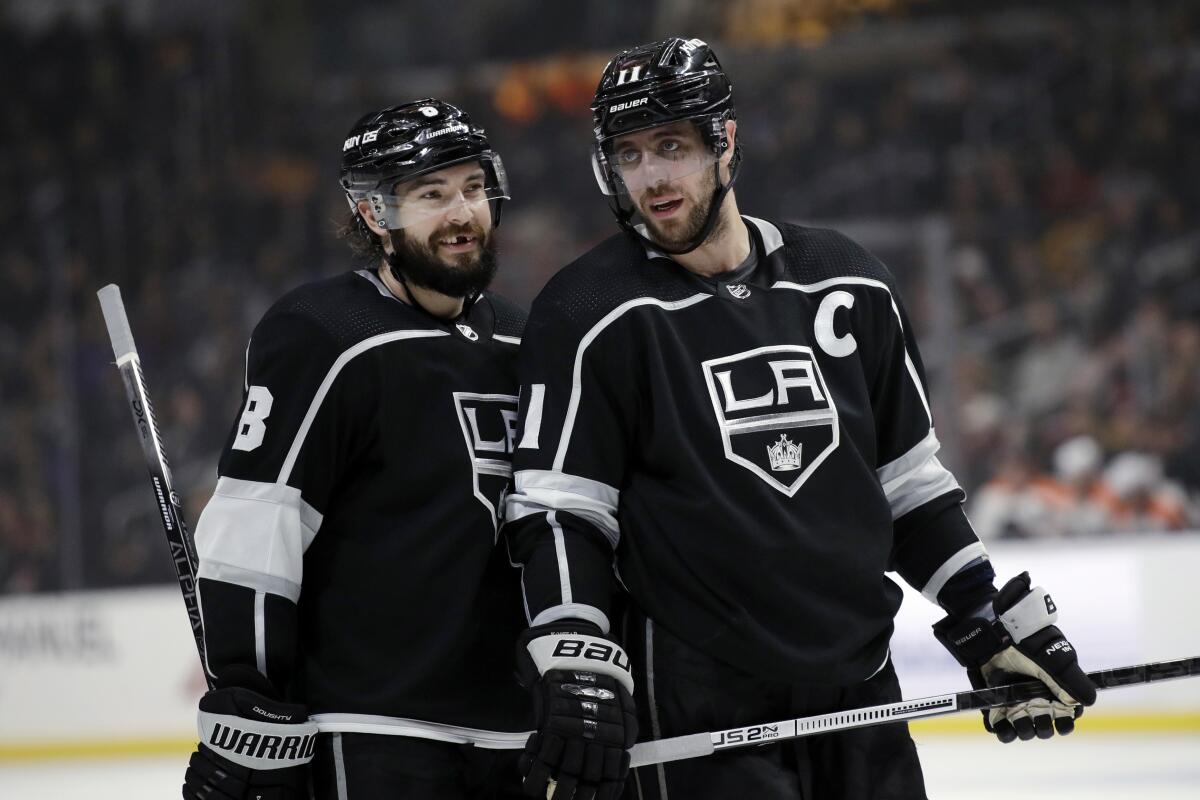
Not only will teams play all of their games against division opponents this year, but most games have been scheduled in mini two-game series played within two- or three-day spans.
It’s a new dynamic that could impact the competitive balance of the 56-game season.
“Division games were always huge, and now this puts even more emphasis,” Kopitar said. “There’s going to be a lot of almost jumping over teams, where somebody loses a couple, somebody wins a couple. It’s gonna be a big difference as opposed to going out to other divisions. … It’s going to be tight [in the standings] probably for a long time.”
Doughty, in particular, was excited about the matchups the new schedule creates, especially with such Western Conference powers as the Colorado Avalanche and St. Louis Blues joining their division for the year.
“I play better when I have an emotional attachment to the game,” Doughty said. “When you have a big threat looking across the ice at you like [Colorado forward Nathan] MacKinnon or [Ryan] O’Reilly from St. Louis … it makes you get up just a little more.”
Go beyond the scoreboard
Get the latest on L.A.'s teams in the daily Sports Report newsletter.
You may occasionally receive promotional content from the Los Angeles Times.